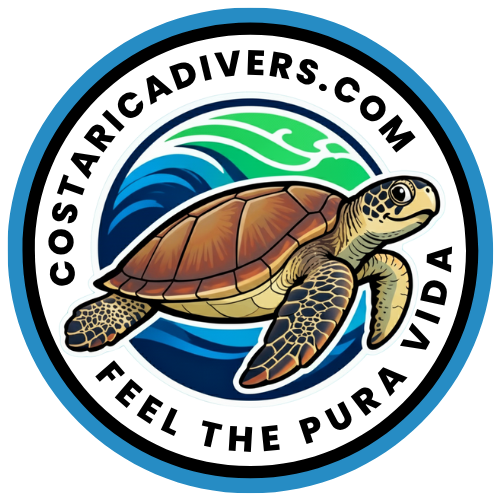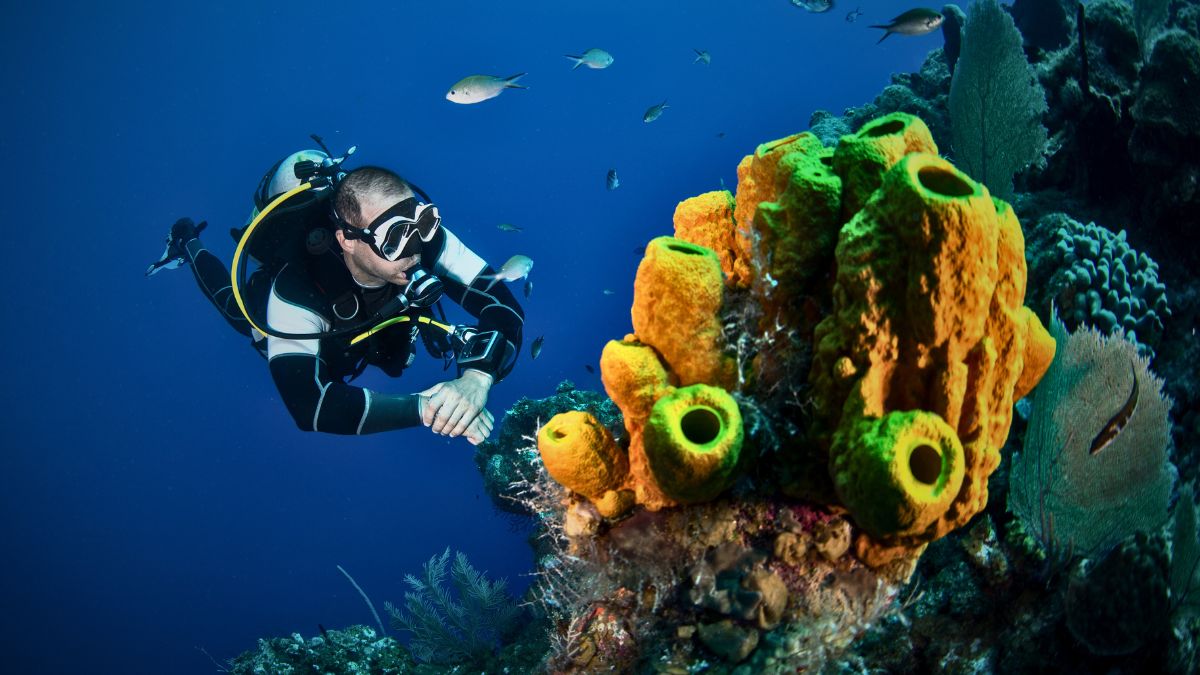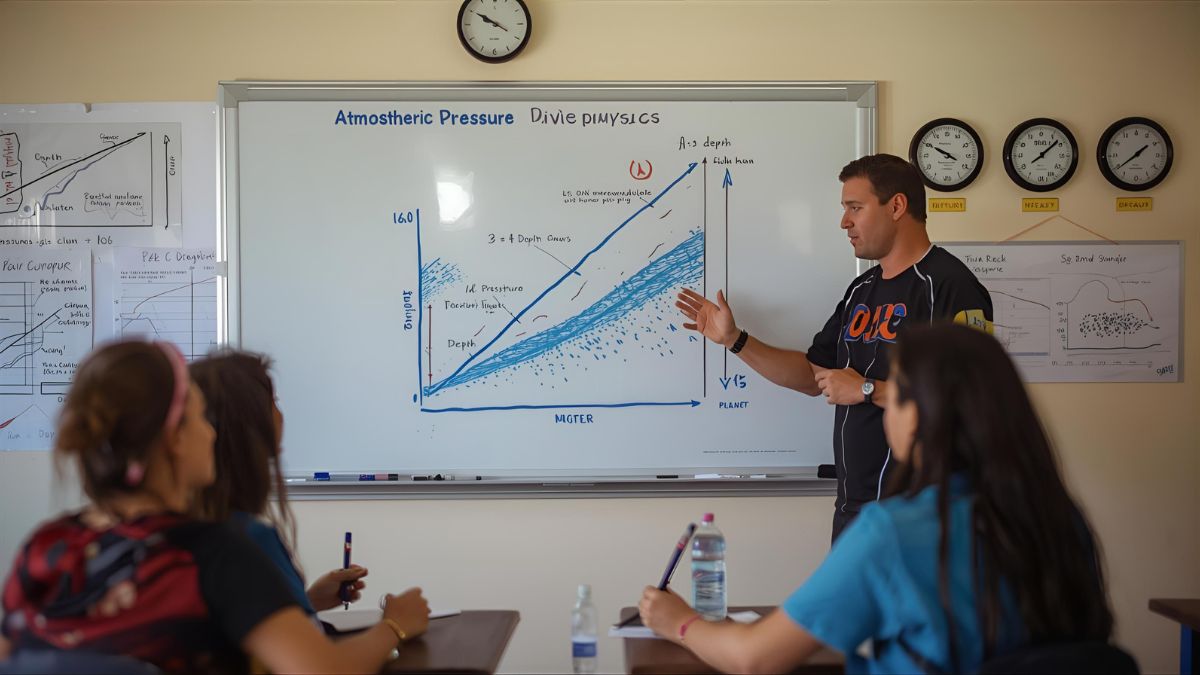“Is it worth doing the Advanced Open Water Diver course?” I hear this question all the time from students who just finished their basic scuba diving course. And I get it. The word “advanced” makes people think they need years of experience first.
Let me clear this up. The PADI Advanced Open Water Diver course isn’t for experts. It’s your second step in dive training, designed for people who literally just got certified.
Today I’ll explain why this course is worth your time and money, what you’ll actually do during training, and whether you should take it right away or wait a bit.
What Is the PADI Advanced Open Water Diver Course?
The PADI Advanced Open Water Diver course builds your skills through five Adventure Dives over two or three days.
Two dives are mandatory: deep diving and underwater navigation. You pick the other three from options like night diving, wreck diving, buoyancy control, or underwater photography.
Here’s the key thing. You can start immediately after your PADI Open Water Diver certification. You don’t need dozens of logged dives or months of experience. The name just means you’ll be more advanced after completing it.
Why Should You Become an Advanced Open Water Diver?
Three main reasons make this certification valuable for most divers.
Does Advanced Open Water Let You Dive Deeper?
Your depth limit jumps from 18 meters to 30 meters. That’s almost double your previous range.
This matters because many of the best dive sites live between 18 and 30 meters. Spectacular walls, interesting wrecks, and certain marine life encounters require this depth certification.
In Costa Rica, this means accessing deeper sections of Caño Island, exploring wreck sites fully, and diving locations that were previously off-limits.
Did you know? That extra 12 meters of depth certification represents about 40% more of the recreational diving range. Many spectacular underwater features exist specifically in this 18-30 meter zone.
How Does Advanced Open Water Improve Your Skills?
Depth is nice, but skill development matters more.
You’ll work extensively on buoyancy control during the Peak Performance Buoyancy Adventure Dive. Most new divers struggle with this, and improving it makes every future dive easier and more enjoyable.
Navigation training teaches compass use and natural navigation. These skills transform you from someone who follows the guide to a diver who can plan and execute independent dives.
Each Adventure Dive builds confidence. You become more comfortable with equipment, more aware underwater, and better at handling different conditions.
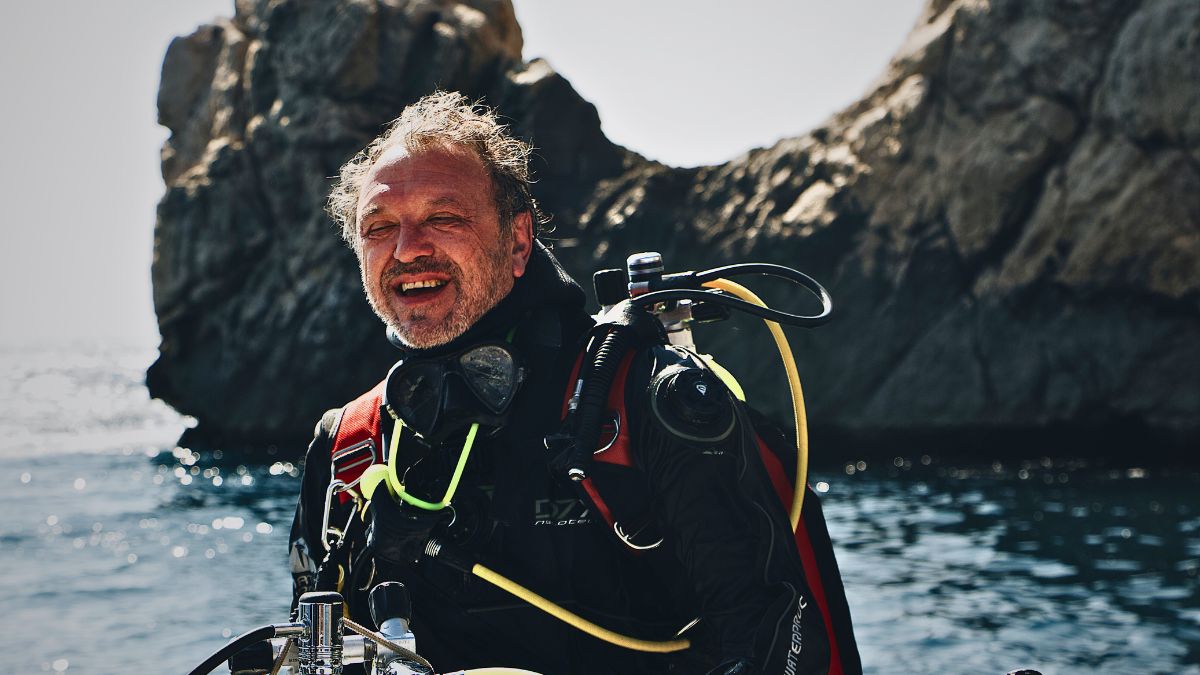
Can Advanced Open Water Lead to More Certifications?
Each Adventure Dive counts toward the related specialty certification.
Choose underwater photography as an elective? That dive counts as your first dive toward the full Photography Specialty. Same for every Adventure Dive you complete.
This creates a natural path forward in dive training. Try different specialties during your Advanced course, see what interests you, then pursue full certifications later.
What Will You Learn During the PADI Advanced Course?
Let me walk through what happens during the five Adventure Dives.
What Happens During the Deep Dive Adventure?
The deep dive is mandatory because it prepares you for your new 30-meter depth limit.
Before the dive, your instructor asks you to do something simple on the surface. Write your name on a slate, arrange numbers, or solve a basic puzzle. You time how long it takes.
Then you do the exact same thing at 30 meters depth. The difference is eye-opening. What took 30 seconds on the surface might take two or three minutes at depth.
This exercise demonstrates nitrogen narcosis in a safe, controlled way. You experience how depth affects thinking and reaction time.
What Is Nitrogen Narcosis and Should I Be Worried?
Nitrogen narcosis sounds scary but it’s just a normal response to depth.
At greater depths, nitrogen affects your nervous system under increased pressure. Most divers feel slight mental fog, slower thinking, or mild euphoria. Some compare it to one glass of wine.
The important part? It’s completely reversible. Ascend to shallower water and it disappears within minutes.
By experiencing it during your Advanced course with an experienced instructor, you’ll recognize the symptoms and manage them confidently on future dives.
Fun fact: Professional dive guides use natural navigation more than compass navigation. Once you develop this skill, you navigate like the pros by reading underwater terrain like a map.
What Does the Underwater Navigation Adventure Teach You?
Navigation is the second mandatory dive for good reason. This skill is crucial for safe, independent diving.
You’ll learn compass navigation and natural navigation techniques. Before getting in the water, you practice on land with “compass walks.” These surface exercises help you understand compass mechanics without the added complexity of being underwater.
Underwater, you practice swimming specific patterns, returning to your starting point, and relocating objects. You also learn natural navigation using sand ripples, coral formations, depth changes, and light direction.
Why Is Underwater Navigation So Important?
Picture this: you’re diving at an amazing reef on the other side of the world. You lose track of the group and can’t find your way back. You spend the entire dive swimming over empty sand, seeing nothing, eventually surfacing far from the boat.
This happens to divers without navigation skills.
Good navigation prevents getting lost, helps you find interesting features, and gets you safely back to your exit point. It gives you independence so you’re not always following a guide.
What Elective Adventure Dives Can You Choose?
After the two mandatory dives, you pick three electives. Options vary by location and dive center.
What Is Peak Performance Buoyancy?
Peak Performance Buoyancy is one of the most valuable electives available.
You learn to hover motionless, maintain horizontal trim, and move through water efficiently. These skills reduce air consumption, protect marine life from accidental damage, and make diving feel effortless.
Many instructors consider this dive essential. It dramatically improves enjoyment and safety.
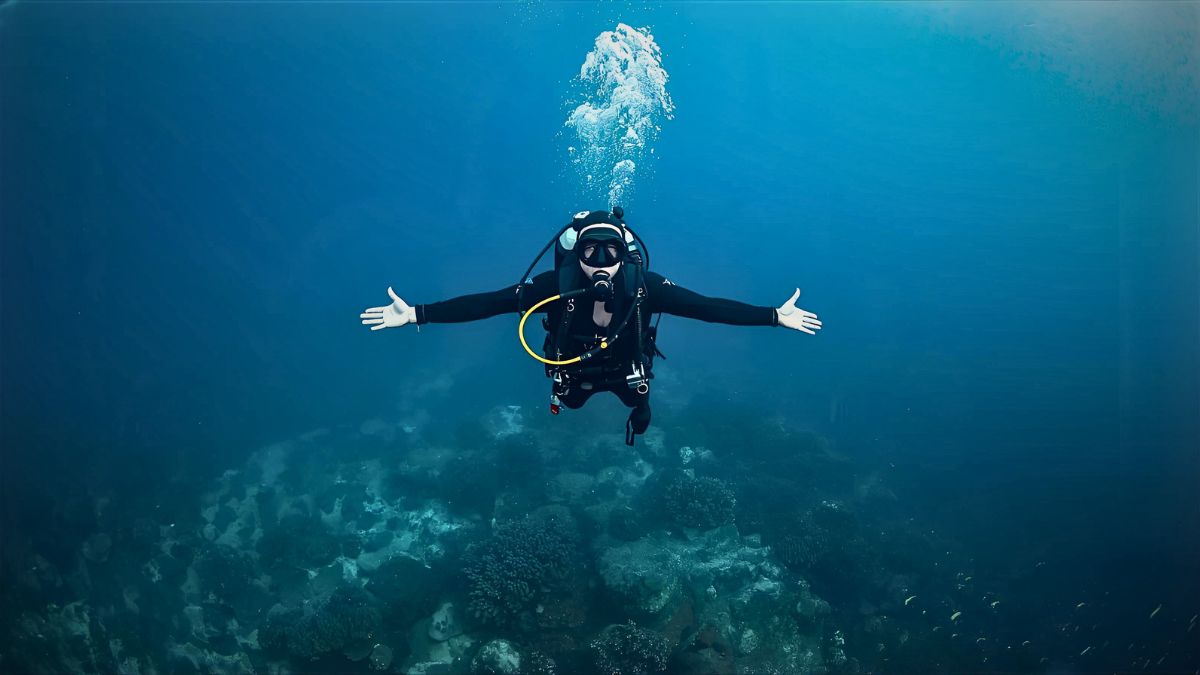
Can You Try Night Diving in Advanced Open Water?
Night diving transforms the underwater world completely. Nocturnal creatures emerge, colors change under dive lights, and everything feels new.
Many divers feel nervous about night diving, which makes it ideal to try during your Advanced course. Having an instructor eliminates the anxiety of trying it alone.
You learn light techniques, night communication signals, and low-visibility navigation. Most students describe it as magical and it often becomes their favorite type of diving.
What Other Adventure Dives Are Available?
Common options include:
Wreck Diving – Learn to safely explore sunken ships and artificial reefs with proper techniques and safety procedures.
Fish Identification – Recognize and name marine species you encounter, making every dive more interesting.
Search and Recovery – Find lost objects underwater and bring them to the surface using lift bags.
Underwater Photography – Learn camera techniques, composition, and lighting for capturing underwater images.
DPV (Diver Propulsion Vehicle) – Experience underwater scooters that extend your range and add excitement.
At our Costa Rica dive center, we typically offer Peak Performance Buoyancy, Fish Identification, and Search and Recovery, with other options by request.
What Are the Requirements for the PADI Advanced Open Water Course?
Requirements are straightforward and accessible to most certified divers.
What Is the Minimum Age for Advanced Open Water?
You need to be at least 15 years old for full certification with a 30-meter depth limit.
Divers aged 12-14 can earn Junior Advanced Open Water Diver certification, but depth is limited to 21 meters until they turn 15.
Younger divers aged 10-11 can work toward Junior Adventure Diver certification with three Adventure Dives. At age 12, they can add the deep dive and upgrade to Junior Advanced Open Water Diver.
What Prerequisites Do I Need for the Advanced Course?
You need a PADI Open Water Diver certification or equivalent entry-level certification from another recognized diving organization.
You must be in good physical and mental health with no conditions making diving unsafe. Medical concerns require physician clearance before participating.
Here’s the surprising part: you don’t need any specific number of dives beyond your Open Water certification. You can finish Open Water on Friday and start Advanced on Saturday.
Did you know? Divers who complete Advanced Open Water within six months of Open Water certification are significantly more likely to remain active divers. Early progression builds confidence that keeps people diving for life.
Can I Take the Advanced Course Right After Open Water?
Yes. This is probably the most common question I get, and my answer is always encouraging.
The term “advanced” confuses people. You don’t need to be advanced to take this course. It’s specifically designed for people who just completed basic certification.
Many students at our Costa Rica dive center complete both courses back-to-back in one trip. We offer combined packages running over five days. This approach has real advantages.
Open Water and Advanced Course
Your skills are fresh. You’re already in diving mode mentally and physically. You haven’t developed bad habits or forgotten what you learned. The progression feels natural.
Some divers prefer waiting to gain experience first. This has merit too. You might want several dives as a new Open Water Diver, build comfort, then return for Advanced training when ready.
Both approaches work. The choice depends on your personality and comfort level. In my experience, students taking courses back-to-back rarely regret it. They leave confident and ready to dive anywhere.
How Long Does the Advanced Open Water Course Take?
The PADI Advanced Open Water Diver course typically takes two to three days.
You complete five dives total. With good weather and efficient scheduling, these fit into two full days. Some centers spread training over three days for a more relaxed pace.
Duration also depends on how you complete the knowledge development portion.
What Is PADI eLearning and Should I Use It?
PADI eLearning lets you complete all classroom study before arriving at the dive center. You work through material at your own pace on computer, tablet, or smartphone.
Using eLearning significantly reduces time at the dive center. Instead of sitting in a classroom for hours, you arrive ready to dive. This can compress the entire course into two days instead of three.
eLearning is particularly valuable when traveling for certification. Study during your normal routine at home, then use vacation time for diving rather than classrooms.
Content is identical to traditional instruction. You watch videos, read material, answer questions, and take knowledge reviews. The system tracks progress and ensures understanding before moving forward.
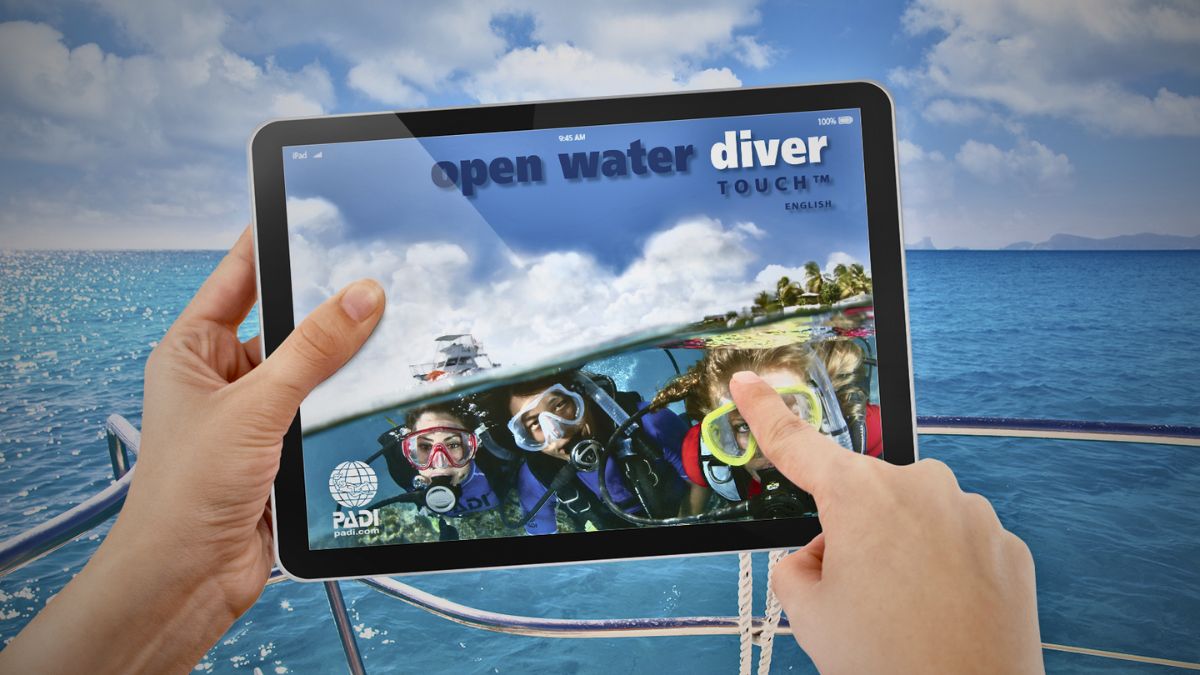
Is the Advanced Open Water Course Difficult?
This concern comes up constantly, and I understand the worry. But the PADI Advanced Open Water Diver course is actually easier than Open Water in most ways.
Think about what you accomplished during Open Water certification. You learned to breathe underwater, clear your mask while submerged, recover your regulator, and control buoyancy. You transformed from someone who never used scuba gear into an underwater explorer.
That was the hard part.
Advanced builds on skills you already have rather than teaching completely new concepts.
There’s much less classroom study compared to Open Water. You won’t spend hours memorizing dive tables or decompression theory. Focus is on practical, hands-on learning through actual diving.
Here’s another factor: there’s no final written exam for the PADI Advanced Open Water Diver course. You complete knowledge reviews before each dive, but there’s no comprehensive exam at the end.
The course is built around experience and confidence. You practice skills you know in different contexts. You try new diving types with your instructor beside you. Learning happens naturally through doing.
Frequently Asked Questions
How Many Dives Do I Need Before Taking the Advanced Course?
Zero additional dives beyond those completed during Open Water Diver certification. The only requirement is holding an Open Water Diver certification or equivalent.
This surprises many divers who assume they need numerous logged dives first. PADI specifically designed the system to allow immediate progression from Open Water to Advanced Open Water.
What’s Typically Included in the Course Price?
Pricing varies significantly by location, but most PADI Advanced Open Water Diver courses include instruction fees, certification processing, and dive center equipment use.
You typically provide your own basic gear like mask, fins, snorkel, and exposure protection. Some centers include these, others rent them separately.
Course manual or eLearning access usually costs extra. Boat fees for accessing dive sites might be separate, especially at locations requiring boat transport.
Always ask for a complete breakdown of what’s included and what costs extra. This helps you compare accurately and avoid surprises.
Can I Choose All My Adventure Dives?
No. Two of five Adventure Dives are mandatory: deep diving and underwater navigation. These are required because they teach essential skills every Advanced Open Water Diver needs.
You choose the other three from options at your dive center. Most places offer at least six to ten different choices.
Some Adventure Dives need specific conditions or equipment that might not be available everywhere. Wreck diving needs a wreck, ice diving needs frozen water, altitude diving needs elevation.
Will I Definitely Experience Nitrogen Narcosis?
Most divers feel at least mild nitrogen narcosis during the deep dive, but responses vary. Some people notice significant effects at 30 meters, others just subtle changes.
Symptoms are temporary and completely reversible. They vanish when you ascend. The goal isn’t to scare you but help you recognize the feeling so you’re not surprised on future dives.
Your instructor monitors you closely and will abort the dive if necessary. The task exercise at depth helps you notice how narcosis affects you personally.
What Equipment Do I Need for Advanced Open Water?
You need the same basic scuba equipment from Open Water: mask, fins, snorkel, exposure suit, BCD, regulator, dive computer or depth gauge and timer, and compass.
Some Adventure Dives require specialized equipment. Night diving needs a primary dive light and backup. Some centers provide these, others require you to purchase or rent them.
If you don’t own equipment yet, most centers offer complete rental packages. This lets you complete the course before investing in your own gear.
Should You Take the PADI Advanced Open Water Diver Course?
After years teaching this course, my answer is yes for most divers. Benefits outweigh the time and money investment.
Depth certification alone opens countless dive sites that remain off-limits to Open Water Divers. Skill development makes you more confident, capable, and safer. Exposure to different diving types helps you discover what you love most.
This course works well for anyone who enjoyed Open Water training and wants to keep developing. It’s ideal for divers who felt the learning process was too short and want more guided instruction. It’s valuable for anyone planning dive vacations where many sites exceed 18 meters.
Make yourself a diving gift and sign up for your PADI Advanced Open Water Diver course today. Your underwater adventures are just beginning.
Sources used in writing this blog
This article is based on guidelines and research from the following authoritative sources:
- PADI – Advanced Open Water Diver Manual and Safety Guidelines
- Divers Alert Network (DAN) – Diving safety research and medical information
- Many years of diving experience as a diving instructor
